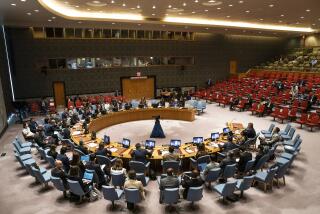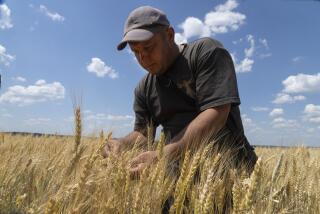Lyng Denies Soviet Grain Deal in Works
- Share via
NEW ORLEANS — Agriculture Secretary Richard E. Lyng said Monday that published reports last week that his department is “secretly coaxing” the Soviet Union to make another big wheat purchase--reports that sent wheat futures shooting upward--are without foundation.
Lyng, speaking with reporters at the American Farm Bureau Federation’s annual meeting here, at first repeated the department’s “no comment” statement of last Wednesday. But he voluntarily added that “nothing happened” at the reported London meeting of two of his chief aides and Soviet officials.
Contracts for future deliveries of wheat and corn soared to new records last Wednesday and Thursday at the Chicago Board of Trade. Analysts speculated at the time that Thomas Kay, administrator of the Agriculture Department’s foreign agricultural service, and Donald J. Novotny, director of its grain and feed division, were in London to persuade the Soviets to make another major wheat purchase, tying the discounted price of that to an additional Soviet purchase of corn at prevailing market prices.
“There was nothing that happened there that should have had anything to do with the (wheat futures) market,” Lyng said.
In answer to a question by a Japanese reporter regarding Japan’s persistent refusal to open its doors to any foreign-grown rice, Lyng said the Reagan Administration will continue to try to persuade Japan to relax its traditional ban in the face of its huge trade surplus.
California’s rice growers would stand to benefit most from any opening of the Japanese market because of their shipping advantage over the Southern Rice Belt states. But Lyng said Japan’s “emotional” attachment to maintaining self-sufficiency in rice production has made the issue “the symbol of extreme protectionism” and invests it with more importance than it otherwise would merit.
“Americans have a great deal of difficulty understanding how Japan--with a $50-billion favorable trade balance with the United States--can ship as much of almost anything it produces into the United States but won’t allow any rice in at all,” Lyng told the Japanese reporter.
Lyng added, however, that relations between the two countries “are too important to be allowed to founder” over the rice issue.
Later, as the 3.6-million-member American Farm Bureau Federation opened its 69th annual meeting, its president, Dean Kleckner, an Iowa hog farmer, told delegates that the days of government support of farm commodity prices is nearing an end.
“We cannot--we must not--depend on large-scale federal appropriations to make up the difference between the income we get in the marketplace and the larger income we need,” Kleckner said. “In that direction lies the ever-deepening swamp of government intervention--of production and marketing controls” that would, he predicted, “turn farmers and ranchers into wards of the government.”
The farm bureau, the nation’s largest organization of family farmers, strongly supported the Food Protection Act of 1985, in which price supports for a dozen commodities are being reduced over the act’s scheduled five-year life. California’s members are among the most ardent advocates of ending subsidized farming--in part because relatively few of them grow the dozen basic commodities covered by federal farm programs.
More to Read
Inside the business of entertainment
The Wide Shot brings you news, analysis and insights on everything from streaming wars to production — and what it all means for the future.
You may occasionally receive promotional content from the Los Angeles Times.










